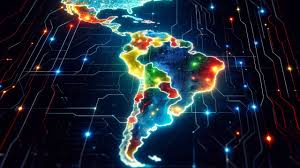Latin America and AI: Regulation or Technological Dependence?

On our continent, there is not only concern about the consequences of technological development for its inhabitants and the planet, but the regulations that are being implemented still encounter barriers to their progress.

37% of citizens agree that artificial intelligence could increase inequalities in their countries. CRAVETIGER (GETTY IMAGES )
NATALIA ZUAZO . El Pais, Spain
At the start of 2025, all eyes on technology and artificial intelligence turned north, with two significant events. During his second inauguration, Donald Trump confirmed the alignment of the owners of large technology companies with the Republican administration. This move included the revocation of Executive Order 14110 of 2023, which proposed "the safe, secure, and reliable development and use of artificial intelligence." It was crowned with the appointment of Elon Musk as head of the Department of Government Efficiency , an extreme technocracy that seeks to combat the excesses of bureaucracy, although others warn that it will go against the very foundations of democracy.
A month later, the AI Action Summit organized by Emmanuel Macron in Paris was expected to serve as a counterweight to work on “inclusive and sustainable artificial intelligence for people and the planet.” However, it proved a disappointment. Academics, civil society members, and activists, especially from the global south, echoed their complaint: the European meeting amounted to little more than the launch of a €109 billion investment to “make France an AI powerhouse” and position the country in the same race as the United States and China, but monetized by the world's richest men.
This geopolitical scenario, which is poised to advance technological developments without limitations, seems to leave Latin America with no choice but to adapt or debate alternative scenarios. But looking inward, recent studies indicate that not only is there concern on our continent about the consequences of technological development for its inhabitants and the planet, but the regulations being implemented still encounter barriers to their advancement.
According to a study conducted by Luminate and Ipsos in Argentina, Brazil, Colombia, and Mexico in 2024, 55% of people support regulating artificial intelligence. This proportion rises to 65% among those who report having a good understanding of or having used these tools. In the most unequal region in the world, 37% of citizens agree that artificial intelligence could increase inequalities in their countries. “With AI, we have the opportunity to learn from the mistakes we have made with social media platforms, where the consequences of a lack of accountability are felt throughout our region, from the uncontrolled spread of misinformation and hate speech to increased polarization and surveillance,” says Felipe Estefan, Luminate's vice president for Latin America. On this continent, 54% of respondents oppose the use of AI to make decisions in courts, 51% oppose its use to draft laws, and 50% find the use of AI to determine who is eligible for social benefits unacceptable.
Regulations and limits
During 2024, various Latin American countries made progress on regulations. A notable example was Brazil, whose Senate approved a bill to establish standards for the responsible governance of artificial intelligence systems. The text, which must now be passed to the other chamber for approval, was inspired by the European Union's AI Law by proposing a system to categorize risks and prohibit the implementation of those that affect people, while also imposing impact assessment obligations for developers. To rule out false dilemmas, the bill "is based on the premise that there is no dilemma—a mutually exclusive choice—between the protection of fundamental rights and freedoms, the valorization of work and the dignity of the human person in the face of the economic order, and the creation of new value chains."
The Brazilian process is proving extensive. It began in 2022 with the creation of various committees and drafts of the bill, with the private sector accounting for a large portion of the hearings. According to research by Intercept Brasil and Derechos Digitales , 31% of the debate spaces were occupied by companies, while academia and civil society participated in 26% and 19%, respectively. Intercept also revealed that corporate representatives, in many cases, presented themselves at the hearings as part of other sectors, demonstrating the interest of tech companies against this regulation and their significant lobbying power to disguise their interests as foreign. Meanwhile, other initiatives have advanced with varying success in the region.
According to the Latin American Artificial Intelligence Index (ILIA) , compiled by ECLAC, Chile, Brazil, and Uruguay are the countries that have not only made progress in implementing AI-based technologies but are also directing their national strategies toward the consolidation and expansion of these technologies in all sectors of their economy and society. According to the United Nations agency, "they also have a favorable environment that fosters research, development, and the adoption of technologies, promoting innovation and the application of AI." They are followed by Argentina, Colombia, and Mexico as countries in a lower category, but still developing.
Even with these advances, the report notes that challenges persist regarding women's equitable participation in AI research and development, which requires the implementation of gender-sensitive policies, even in the countries best qualified for adopting policies for the sector. Other goals to be achieved in the region include the incorporation of better infrastructure and the retention of people trained in technologies: the migration of the most skilled people to the northern part of the world conspires against their own models.
In environmental terms, in 2024 the Index incorporated the sustainability factor into the development of AI, highlighting that "reflection on the environmental impact of models, particularly their energy consumption, must be encouraged," since "there is a certainty that demand for this technology will continue to grow in the medium term." It highlights the need to leverage the local advantages of Latin America and the Caribbean to promote the use of clean energy and the computing and data storage industry as "a reasonable path to increasing the competitiveness and sophistication of economies." However, there is no debate on how to manage scarce and polluting energy resources, taking into account not only technological advancement but also the development needs of countries.
Identity or dependency
In this scenario, it's worth asking how regions like Latin America can support the development of artificial intelligence ecosystems that are more aligned with their own history and present, and that reflect local values and needs. "Our region is considered solely to provide the natural resources and labor needed by the global AI production chain," says Paz Peña , author of Technologies for a Planet on Fire and a senior fellow at the Mozilla Foundation. "As a continent, we face economies that still have colonial logic. There will be more than a few countries that, due to their size, location, and labor qualifications, could offer something more than natural resources to this race, for example, chip assembly. But thinking about our own AI developments, with a logic outside of Big Tech , with a local perspective, is almost impossible," she adds.
For that to happen, says Peña, investment would be needed in systems development, which depends on infrastructure mostly supported by large technology companies in the North. "Furthermore, to be competitive, enormous investments would be required, and I think it's ethically reprehensible that, given the serious social welfare problems we have in our countries, money is invested in these speculation games that bring wealth highly concentrated in a few actors."
Paloma Lara Castro, director of public policy at Derechos Digitales, adds complexity to the discussion: “Based on various studies we have conducted since 2020, we have detected that the use of AI by the region's states is concentrated in critical areas: health, employment, justice, education, access to social benefits, public information, and the protection of public safety. These are areas where the widespread use of AI is accelerating, and it relies on unproven promises, such as the effectiveness and efficiency of spending, fraud prevention, crime prediction, or school dropout rates, among others.” However, Lara adds that this technological race is not accompanied by the protection of rights, whether of personal data, consumer rights, or the prevention of new inequalities. For her, the regional priority should be to promote innovative and participatory public policies that respond to the real challenges of technology, and to do so with regulations, independent oversight mechanisms, and the genuine participation of civil society and affected communities. Otherwise, he warns, "AI in Latin America runs the risk of becoming a tool of control rather than a development opportunity."
Paz Peña agrees that the issues linking development and artificial intelligence, even with these significant challenges, must be addressed seriously and urgently, "from the forces of AI exploitation of our natural resources, to the role of workers, to the limited power of our local legal frameworks to protect our rights against transnational forces." For her, this goes beyond technology policies: it has to do with a global dispute over a democracy that needs more transparency and fewer corporate secrecy, including investigation and accountability into the lobbying mechanisms exercised by technology companies with global power over local governments, regardless of their region of the world.






